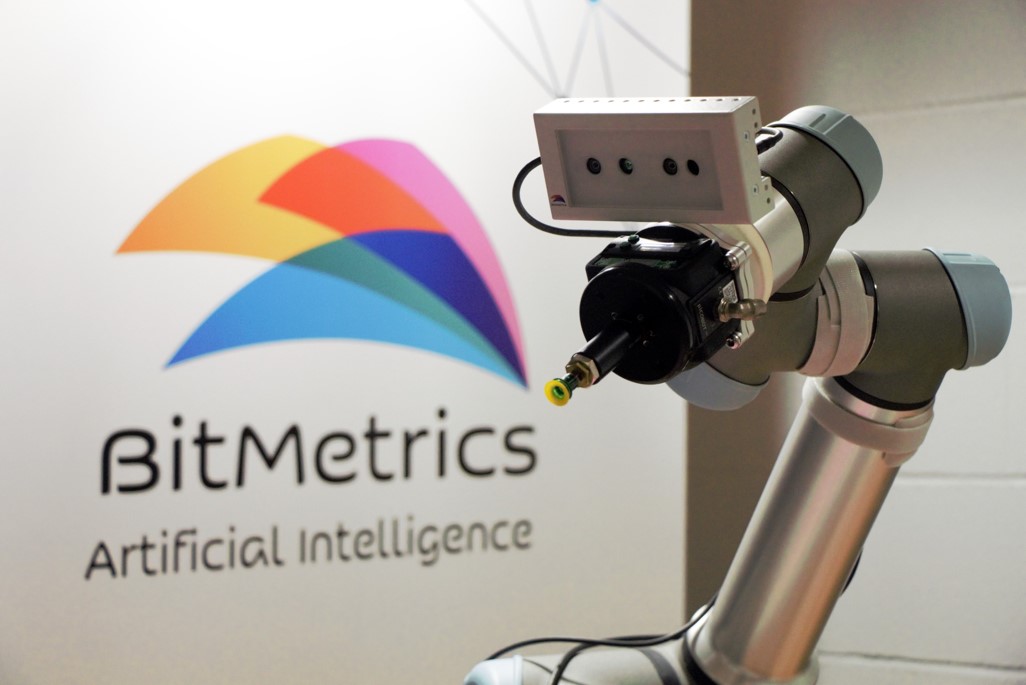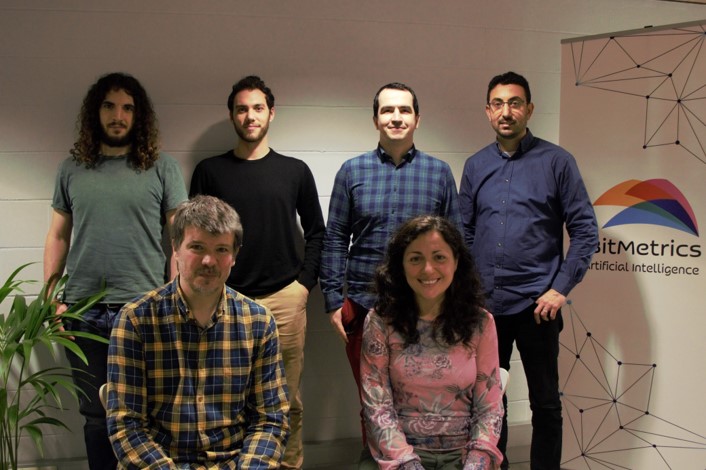BitMetrics makes intelligent automation accessible to manufacturing SMEs

- “Our mission is to bring intelligent automation to SMEs,” says Mar Masulli, CEO of BitMetrics, the most promising industrial start-up of 2020 in Europe
- They are launching their first product: an AI-enabled industrial software and camera, that attached to robotic arms, facilitates the automation of previously unattainable pick & place processes.
Artificial Intelligence (AI) technologies open up a new world of possibilities. For example, it makes intelligent automation accessible and affordable to small and medium-sized enterprises involved in manufacturing, helping them remain competitive in the global market. Many companies, however, face challenges arising from digitisation and automation, such as costs and time constraints.
BitMetrics is a Business-to-Business (B2B) Software as a Service (SaaS) start-up from Barcelona helping in this transition.
Its mission is clear: bringing smart automation to small and medium-sized manufacturing companies. How do they do it? Combining Artificial Intelligence, Computer Vision and Robotics technologies, they offer from simple to top-notch solutions for customers in the manufacturing sector. Currently, they are launching their first product: an AI-powered solution integrating a camera to perform pick & place, pick & sort, Random Bin Picking and visual inspection processes without the need for human labelling.
"At BitMetrics we develop our own technology to equip robots with the ability to see, think and act," explains Mar Masulli, the CEO and co-founder of the most promising industrial start-up of 2020 in Europe.
“We are experts in Computer Vision, what we do is automate processes in which vision intervenes. They are very common in the manufacturing industry. These processes are done by people, since we have a fantastic quality that is eye-hand coordination, and we can grab anything the first time we see it. Instead, current robotic system has to be given detailed instructions (code) on how to do it, and if something changes, they simply cannot adapt. We work on training the technology so that a robot is able to grasp what it sees in real time, even if it is an unknown item. Moving objects represents about 40% of what people do in a factory, so automating these processes has big impact on efficiency.”

Smart automation will streamline very repetitive tasks, but with variations in the context.
Artificial Intelligence has a place because the scene in which the robot works is not always the same, but rather it has to learn to identify and locate known or unknown objects in any position and to grasp and place them in different ways. AI provides great flexibility and gives a qualitative leap to the possibilities of automating these processes.
“These are very repetitive and tedious jobs, with very little added value, and with ergonomic problems. In the future people will no longer want to do them. The new generations do not want to do this type of work,” says Mar Masulli.
The pandemic has accelerated the smart automation transition.
“These tasks are labour intensive, and with social distancing it is difficult. Due to the pandemic, many companies are interested in automating so that the production process is not jeopardized. I would say that the pandemic has made companies aware that they must do something, and that the technology is already there. It is true that it could have taken five more years. Now the priorities have changed.”
AI enables SMEs to stay in tune with the latest advances in intelligent automation, and this is very aligned with the new European Industry Strategy, which aims to be greener, digital, and also more competitive in the global market.
BitMetrics aims to democratise access to intelligent automation of vision-based processes, lowering costs so that the financial barrier is not a problem for SMEs and offering simple implementation solutions, that do not require additional system integration or specific knowledge from the user.
“Our business model is based on subscription, so it is no longer necessary to make six-figure investments. Also, the client does not have to be a specialist in this matter, we offer constant supervision of the process to ensure it keeps on working. I’m thrilled seeing how a traditional sector as the industrial one is being transformed very fast, and now even robots are available for rent.”
Working on customised solutions for SMEs, BitMetrics has been able to validate their technology and they have also been inspired by seeing particular needs and pain points. All of this is applied to its first product, which will be launched on the market in late June.
“It’s an intelligent vision solution integrating a camera that is attached to robotic arms, so that very easily anyone who was not familiar with this type of process could set up a 'pick and place' application, in a very short time. It’s very easy to use,” says Mar, who elaborates that this product stands out compared to what the competition offers because of its technology.
“We are mainly a software company, but with this product we needed to add a hardware component (the camera) to be able to reach the market.”

CONNECTION WITH INVEST HORIZON
For deeptech startups such as BitMetrics, the access to ‘patient capital’ is one of the main stumbling blocks to reaching the market. “Deeptech products can’t be developed in 5 months. We have been developing this product for more than two years. This development requires patient capital, on the one hand, and on the other hand, accepting that the deadlines in research and development can be lengthened if you reach a point of no-exit and have to go back to find an alternative. That is part of the innovation process,” says Mar Masulli.
BitMetrics was the recipient of a SME Instrument I grant in 2019; Spanish Public funds from CDTI and ENISA. Additionally, they raised a seed investment round in early 2021; and in January 2021 they joined the Invest Horizon accelerator programme for deeptech startups.
“Thanks to this programme, we have been able to approach investors who are familiar with longer-term investments and they helped us to understand which indicators an investor would like to see in our proposal.”
At the same time, sharing experiences and working together with other deeptech entrepreneurs was very helpful for Mar, as “we all speak the same language, and we have similar challenges and critical points.”



